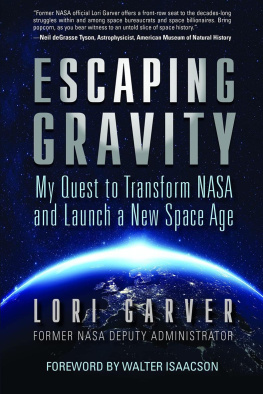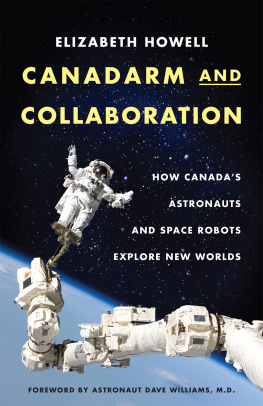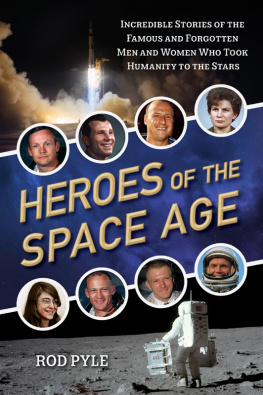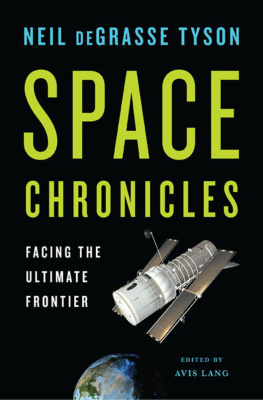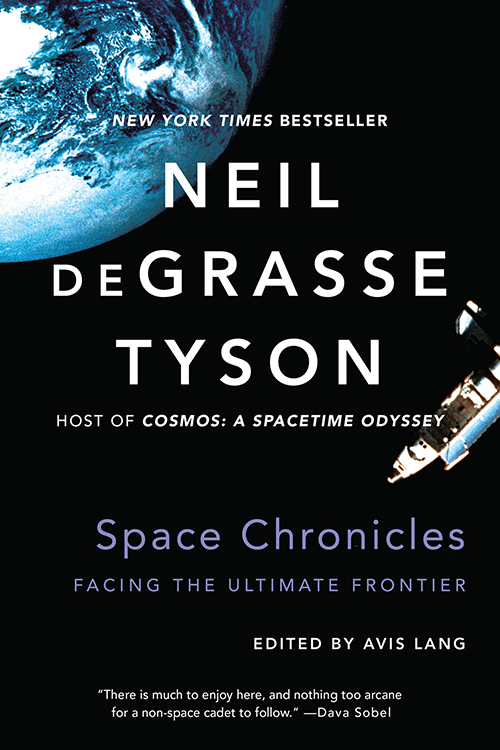
ALSO BY NEIL DE GRASSE TYSON
The Pluto Files: The Rise and Fall of Americas Favorite Planet
Death by Black Hole: And Other Cosmic Quandaries
Origins: Fourteen Billion Years of Cosmic Evolution

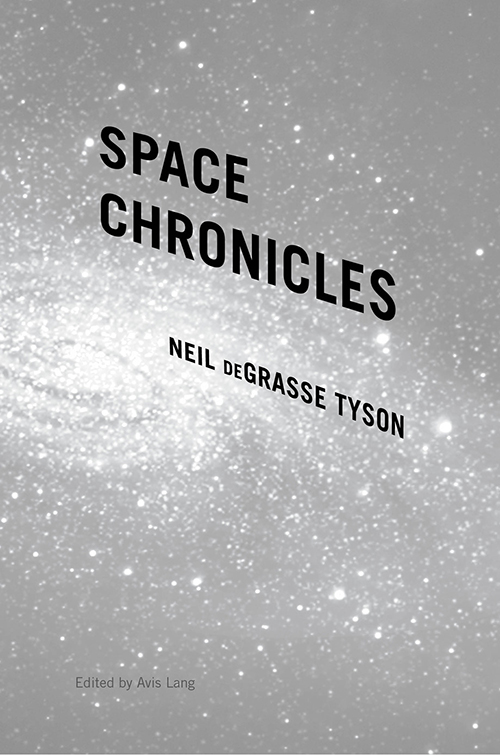
To all those who have not forgotten how
to dream about tomorrow
CONTENTS



EDITORS NOTE
Back in the mid-1990s, Neil deGrasse Tyson began writing his much-loved Universe column for Natural History magazine. At that time, the magazine was hosted, both financially and physically, by the American Museum of Natural History, which also hosts the Hayden Planetarium. In the summer of 2002, by which time Tyson had become the Haydens director, the museums shrinking budget and changing vision led to the placement of the magazine in private hands. Thats when I became a senior editor at Natural History and, more specifically, Tysons editora relationship still in force, though both of us have now, separately, moved on from the magazine.
You wouldnt think an erstwhile art historian and curator would be the ideal editor for Tyson. But heres the thing: he cares about communication, he cares about fostering science literacy, and if, together, we can produce something that I comprehend and that sounds good to him, then weve both succeeded.
Its been more than half a century since the Soviet Union put a small, beeping metal sphere into Earth orbit, and not much less than half a century since the United States sent its first astronauts for a stroll on the Moon. A wealthy individual can now book a personal trip to space for $20 million or $30 million. Private US aerospace companies are testing vehicles suitable for ferrying crew and cargo to and from the International Space Station. Satellites are becoming so numerous that geosynchronous orbit is almost running out of room. Tallies of wayward orbital debris larger than half an inch now number in the hundreds of thousands. There is talk of mining asteroids and concern about the militarization of space.
During the opening decade of the present century in America, blue-ribbon commissions and reports initially fostered dreams not only of a swift US manned return to the Moon but of more distant human space travel as well. NASAs budgets have not matched its mandates, however, and so its recent achievements beyond Earths atmosphere have involved human activities only within low Earth orbit, and only robotic activities at greater distances. In early 2011 NASA warned Congress that neither prevalent launch-system designs nor customary funding levels are capable of getting the United States back to space by 2016.
Meanwhile, other countries have hardly been asleep at the wheel. China sent up its first astronaut in 2003; India plans to do the same in 2015. The European Union sent its first probe to the Moon in 2004; Japan sent its first in 2007; India sent its first in 2008. On October 1, 2010, the sixty-first National Day of the Peoples Republic, China carried out a flawless launch of its second unmanned Moon probe, whose job is to survey possible landing sites for Chinas third Moon probe. Russia, too, is planning a return visit. Brazil, Israel, Iran, South Korea, and Ukraine, as well as Canada, France, Germany, Italy, and the UK, all have firmly established, highly active space agencies. Some four dozen countries operate satellites. South Africa has just formed a national space agency; someday there will be a pan-Arab space agency. Multinational collaboration is becoming de rigueur. Beyond as well as within America, most of the worlds scientists recognize that space is a global commonsa domain appropriate only for collectivityand they expect collective progress to continue despite crises, limitations, and setbacks.
Neil deGrasse Tyson has thought, written, and spoken about all these things and many more. In this volume we have collected fifteen years worth of his commentaries on space exploration, organizing them within what seemed to us an organic framework: Part IWhy, Part IIHow, and Part IIIWhy Not. Why does the human animal wonder about space, and why must we explore it? How have we managed to reach space thus far, and how might we reach it in the future? What obstacles prevent the fulfillment of the space enthusiasts daring dreams? A dissection of the politics of space opens the anthology; a deliberation on the meaning of space completes it. At the very end are indispensable appendices: the text of the National Aeronautics and Space Act of 1958; extracts of related legislation; charts showing the space budgets of multiple US government agencies and multiple countries, as well as the trajectory of NASA spending over the course of half a century in relation to total federal spending and the overall US economy.
Eventually, if not as astronauts then as atoms, well all be caught up in the blizzard of icy dust, the electromagnetic radiation, the soundlessness and peril that constitute space. Right now, though, Tyson is onstage, ready to usher us through catastrophes one minute and crack us up the next. Listen up, because living off-planet might lie ahead.
A VIS L ANG
PROLOGUE
Space Politics
You develop an instant global consciousness, a people orientation, an intense dissatisfaction with the state of the world, and a compulsion to do something about it. From out there on the moon, international politics look so petty. You want to grab a politician by the scruff of the neck and drag him a quarter of a million miles out and say, Look at that!
E DGAR M ITCHELL, A POLLO 14 ASTRONAUT, 1974
Some people think emotionally more often than they think politically. Some think politically more often than they think rationally. Others never think rationally about anything at all.
No judgment implied. Just an observation.
Some of the most creative leaps ever taken by the human mind are decidedly irrational, even primal. Emotive forces are what drive the greatest artistic and inventive expressions of our species. How else could the sentence Hes either a madman or a genius be understood?
Its okay to be entirely rational, provided everybody else is too. But apparently this state of existence has been achieved only in fiction, as in the case of the Houyhnhnms, the community of intelligent horses that Lemuel Gulliver stumbles upon during his early eighteenth-century travels (the name Houyhnhnm translates from the local language as perfection of nature). We also find a rational society among the Vulcan race in the perennially popular science-fiction series Star Trek . In both worlds, societal decisions get made with efficiency and dispatch, devoid of pomp, passion, and pretense.
To govern a society shared by people of emotion, people of reason, and everybody in betweenas well as people who think their actions are shaped by logic but in fact are shaped by feelings or nonempirical philosophiesyou need politics. At its best, politics navigates all these mind-states for the sake of the greater good, alert to the rocky shoals of community, identity, and the economy. At its worst, politics thrives on the incomplete disclosure and misrepresentation of data required by an electorate to make informed decisions, whether arrived at logically or emotionally.
Next page

